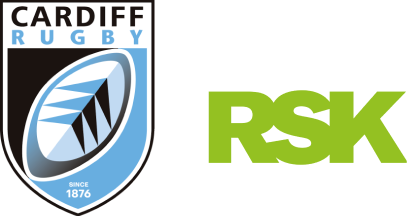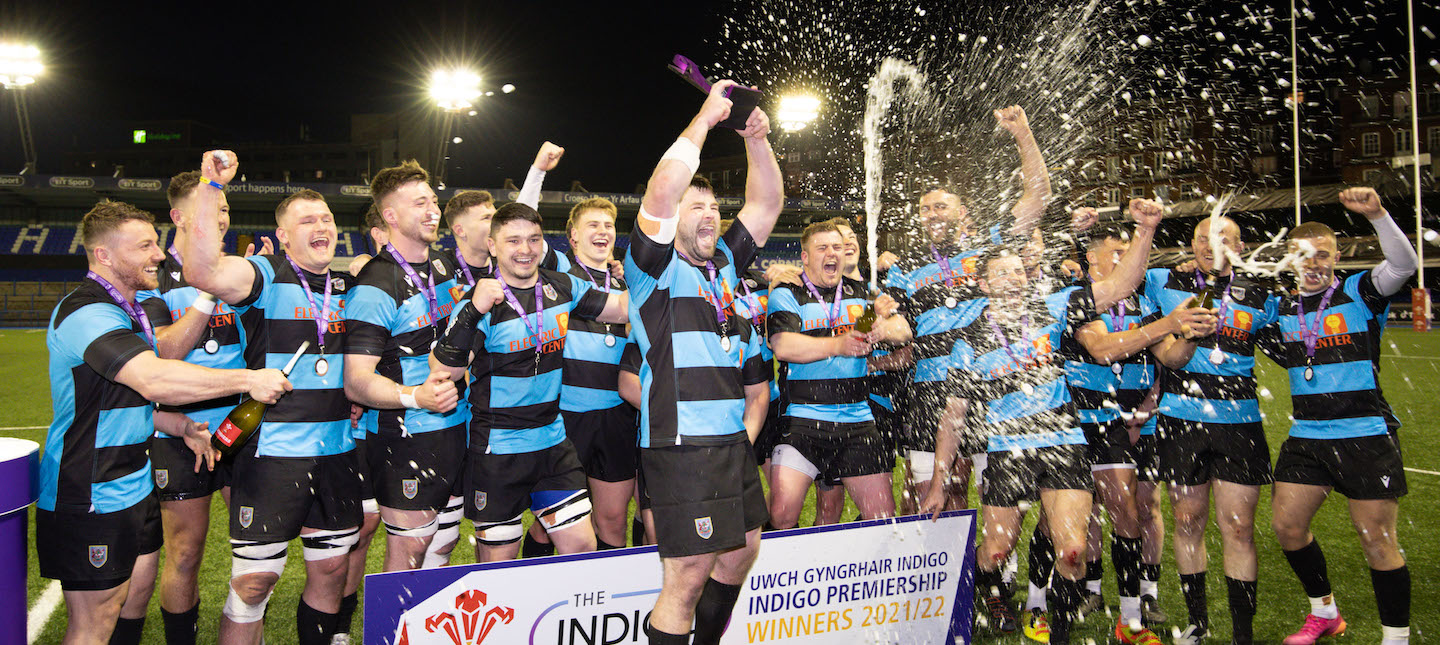Last Thursday, Cardiff RFC lifted their first Indigo Group Premiership title since 2009 in dramatic fashion, beating Merthyr on the final day of the season to complete a stunning comeback in the league table.
While semi professional players such as Morgan Allen, James Beal, Alun Rees and Sean Moore all played crucial roles throughout the campaign, the Rags also proved to be a valuable platform for the club’s youngsters as the likes of Theo Cabango, Jacob Beetham, Ethan Lloyd, Mason Grady and Rhys Anstey made significant contributions to the title charge.
We caught up with Cardiff Rugby academy manager, Gruff Rees, to reflect on the season and review its alignment with the club’s pathway.
We’re at the end of the first season since Cardiff RFC and the club’s pathway system became aligned. You emphasised at the start of the campaign that the priority for the Rags would be the long-term gains as opposed to the added bonus of silverware success. How do you reflect on the first season under the new strategy?
It’s been far from straight-forward behind the scenes. I took the responsibility on and perhaps expected it to be a little bit smoother than it has been.
There has been a few things that myself, Steve Law, Dai Young and Richard Holland have had to connect, and it has been tricky at times.
But the whole purpose of it has been about development opportunities and it’s clearly created that around the minutes that young players have had on the field, and they’ve done really well. For them to look to turn Dai’s head, we have a model in place where they can do that.
You do get emotionally involved, that’s inevitable. We do want that development opportunity but we said from the outset that we’re not a development team. We want to perform to a high level and win rugby games.
To get to the end of the season with something tangible to play for was a good experience for all those involved, especially the chase at the end.
To succeed was pleasing overall, even though it’s not what we’re necessarily measured on. But around the group you had guys like Steve Law, Iestyn Williams, Dyfri Owen, good committee people such as Simon Down, Chris Collins, David Morgan, John Huw Williams, Clive Davies, and of course the supporters. These are people who were there previously around Cardiff RFC and bought into what it was then and what it is now.
It’s been really pleasurable to see hard-earned success for those type of people, let alone the players. I talk a lot about the academy and some of the senior players but I have a huge amount of respect for the semi-professionals in the system as well.
We’ve probably under-resourced the amount of players that we’ve had, and that’s been hard for the coaches at times. But to be fair, boys like Alun Rees, Ollie Drake, Morgan Allen, Alex Everett, Thomas Davies, Evan Yardley, Sean Moore and so on – they’re the guys that have given us substance and make it happen.
Those senior players certainly stepped up and I’d include Dan Fish in that. His role as a player is key to a lot of things that we’ve done, as has the coaches. Himself, Craig Everett, Scott Andrews, Ian Evans all had massive impact.
And when you talk of the young players, even though they weren’t in the 23 against Merthyr, you had Mackenzie Martin observing Morgan Allen. He’s seen how he has gone about his work over the last two or three weeks, into matchday and how he performs. It’s an example for him in terms of the type of character that we want in the system and how he can develop.
Likewise Harrison James being around the group, learning from different guys on a continual basis. That’s worked really well for us.
Cam Winnett, Theo Cabango and Jacob Beetham have benefitted from learning from James Beal, who has been a real talisman for us in the back three. Other boys like Jack Maynard has been unheralded but everyone has played a part in this group in different ways, which has allowed us to do well on the rugby field.
We’re trying to shape positive experienced for these young players, but even through the struggles we’ve had at times. I see that as a positive, when we’ve come up against difficult sides like Newport and Merthyr over the course of the year.
This is the first time in Wales that we’ve seen a Premiership side being used in this particular way. Is next year about taking the learnings, tweaking the process where needed and taking it a step further as a development asset for the club?
We looked at this system at a time when we didn’t have any real clear vision and guidance for the future of what development games looked like. It was something that we could manage, control and get a grip of.
But at the same time, I’m passionate about growing the game and raising standards in the Premiership. It’s been begrudged at times but most clubs, when you sit down with them, understand and support it. They also realise that there’s commercial revenue on the gates for a lot of them too. People come to watch, we play good rugby with young, talented players and people want to come to see us.
“An example is Theo Cabango’s progress, and that’s lighting up the Welsh game. For Cardiff Rugby fans and others, they see that we can do that and hopefully others can replicate it.
We haven’t got it 100 per cent right behind the scenes. We’ve got to be better with some of our resources in terms of training numbers and working with local clubs. Some of our S&C has been good for us within the building, but we’re trying to align that with your Tuesday/Thursday semi-pro model and that isn’t always straight-forward. There’s elements of the medical side which we’ll also look to get better – taking Dyfri’s experiences, him leaving us in a good place and pushing on from that.
There’s a lot of small things that can make a difference and to try and keep performing next year with other younger players getting more exposure, like Mackenzie, Harrison, Alex Mann who need a good run of senior rugby to show what they can do.
Evan Lloyd is a project for us, in terms of moving to hooker, and how we manage that will be interesting for him and us over the next 121 months. We’re excited to see Rhys Barratt develop as a loosehead. Those are guys we want to see more of.
The Premiership does need investment, and I understand that the WRU have challenges there.
But we need to look at not only the academy demographic of players, but the wider group of 18-23 year olds and how we can engage and keep them. Not just in the Tuesday/Thursday training model but resource around S&C support and whether we can do it via extra cub support.
That’s not something that we can lead on at the moment as it has to be nationally driven but we’ve definitely got ideas how it can be done better across Wales.
In the title run in, there were some high-pressured games in front of fierce, loyal supporters – both home and away. How important is it for youngsters to have a taste of these big game experiences at senior level?
The big game experiences that these players have tasted are huge. You look at Harrison James facing Pontypridd a couple of weeks ago in front of the cameras. It was a challenge for him as he knew there was a lot riding on it in terms of the league and he had to perform around his peers because there’s an expectation when you come in.
You’ve got to be at the top of the game, be physical, do the basics well and add value to the team. But that’s all internally with us.
Around the league, we’re a team that people want to get at, and rightly so with the name that comes associated with Cardiff.
But it’s created some real good rivalries for the coming years. We always enjoy the games against Pontypridd and Merthyr, but Newport in particular were excellent this year and we’ve had challenges against them. I’m looking forward to playing good, competitive games against them for a fair number of years.
They almost replicate the standards of A team rugby, and that’s what we want to aim for.
What are the next steps for Cardiff RFC, both in the short and long term?
Hopefully we’ll have more of a normal age group calendar but it is nice that we can reset a bit.
For the first time in nearly two years, we can have a period of rest and recovery followed by a proper 10-week pre-season period for academy players.
There’s an under-20s campaign that some of our players will work through and our semi pros will go under an eight-week pre-season programme alongside it.
It gives us a platform to plan more effectively.
We’ve got a long-term vision in terms of supporting Dai and what he wants, and we’re seeing some of those talents getting opportunities both for the first team and for the RFC.
We’ll get better and stronger for it in the long term.

